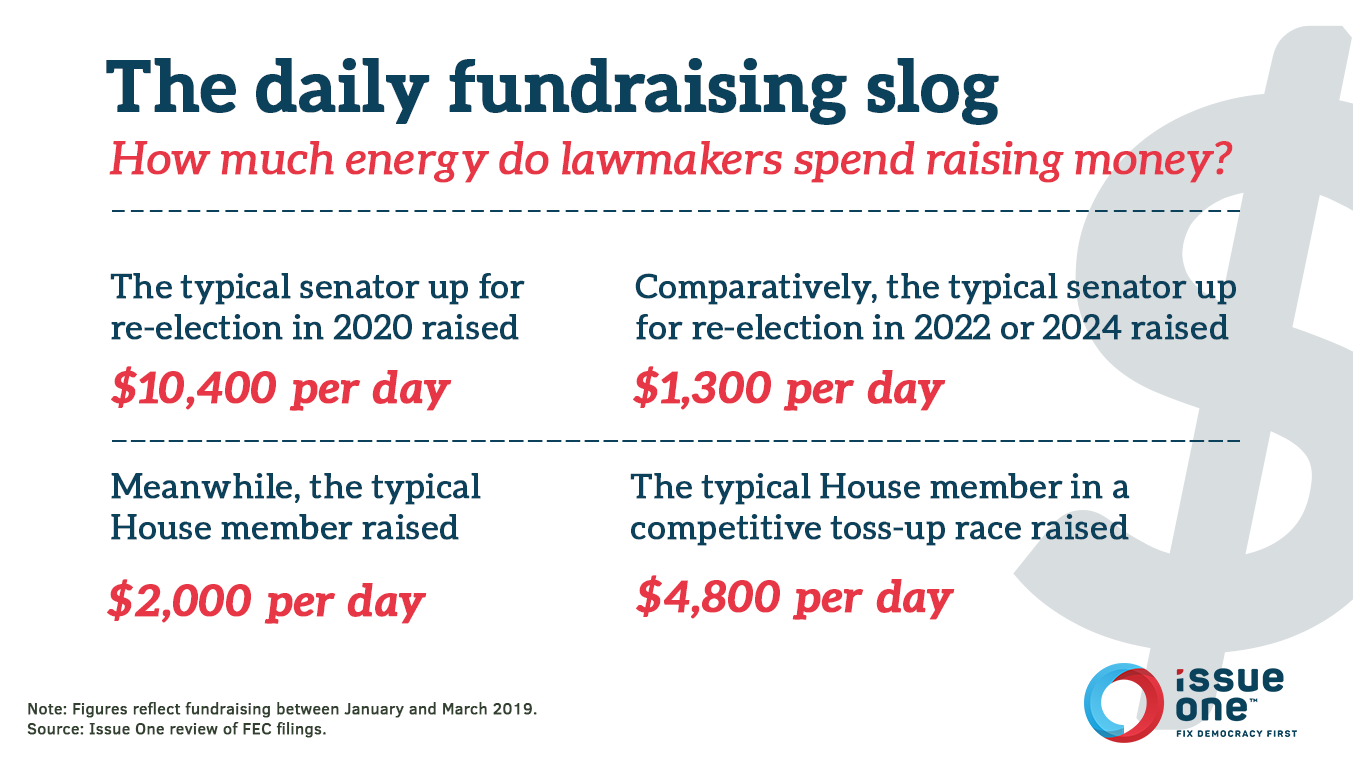Analysis
Four numbers that show how the FEC is MIA
Today marks the start of the third month since the Federal Election Commission (FEC) lost its ability to do its job due to the resignation of one commissioner. Three seats…
Analysis
Amisa Ratliff contributed to this report.
On Monday, congressional and presidential candidates alike filed their first major campaign finance reports of 2019, detailing their financial activities between January 1 and March 31.
Here are some key numbers to know, based on an Issue One review of these new filings.
$936,000
The median amount of money raised during the first quarter by a sitting senator running for re-election in 2020 was $936,000 — the equivalent of about $10,400 per day. That’s more than eight times as much money as their colleagues who are not facing re-election next year: The median amount that senators up for re-election in 2022 and 2024 raised was $116,000 — about $1,300 per day. Combined, all incumbent senators raised $46 million from individuals, political action committees, and other sources between January and March.
$180,000
The median amount of money raised during the first quarter by a member of the House of Representatives was approximately $180,000 — or about $2,000 per day. Meanwhile, the median amount raised by House freshmen was about $292,000 — or about $3,200 per day. For their part, incumbents running for re-election in races rated as toss-ups by the Cook Political Report raised roughly $435,000 — about $4,800 per day. Combined, all incumbent House members raised $104 million from individuals, political action committees, and other sources between January and March.
$106 million
President Donald Trump and 16 of the Democratic candidates seeking to replace him combined to raise $106 million strictly from individual donors between January 1 and March 31, with Trump’s campaign alone collecting about $29.5 million. Among the Democratic candidates, Sens. Bernie Sanders (I-VT) and Kamala Harris (D-CA) raised the most, at $18.2 million and $12 million, respectively.
54%
About 54% of the $106 million raised by President Donald Trump and his Democratic challengers strictly from individual donors during the first quarter came from small-dollar givers who contributed $200 or less. About 54% of Trump’s campaign cash came from donors giving $200 or less, while about 55% of money from individual donors to Democratic candidates came from small-dollar donors giving $200 or less. Such grassroots donors are important because they are more likely to be invested in the political process, to volunteer during the 2020 presidential election, and to vote on Election Day, and they can be tapped to donate over and over again throughout the campaign.
President Trump and 16 of his Democratic challenger raised a combined $106 million strictly from individual donors between January and March, new #FEC #campaignfinance disclosures show
Small-dollar donors giving $200 or less accounted for 54% of this sumhttps://t.co/nOpmYDSmmg pic.twitter.com/cphkWniUWo
— Michael Beckel (@mjbeckel) April 17, 2019
Zero
On Monday, no presidential campaign publicly disclosed any information about its bundlers, the people who are raising money on behalf of a candidate and are credited by the campaign for their efforts. Last week, Issue One led a broad coalition of groups from across the ideological spectrum in urging all presidential candidates to detail information about these elite fundraisers — something that Democrats and Republicans alike have done in the past. An official from Andrew Yang’s campaign told Issue One: “We don’t have any bundlers, but if that changes in the future, we will absolutely disclose that information. We feel transparency and reform in this area is very important.”
Analysis
Today marks the start of the third month since the Federal Election Commission (FEC) lost its ability to do its job due to the resignation of one commissioner. Three seats…
Analysis
More than half of all freshman House members have formed leadership PACs — political committees that are frequently criticized as slush funds — according to an Issue One review of…
Analysis
Congressional and presidential candidates filed their latest campaign finance reports on Tuesday, detailing their fundraising and expenditures between July 1 and September 30. Here are some key numbers to know,…

